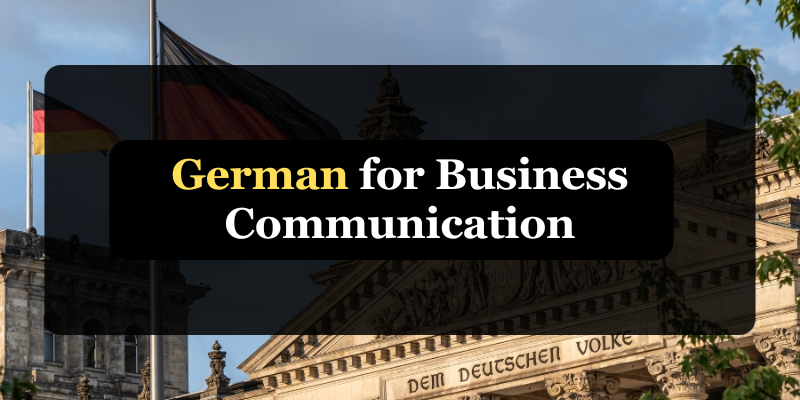
In today’s globalized world, effective business communication is more valuable than ever. While English might be the universal language of commerce, German holds a significant place in the European business landscape. Germany has one of the world’s most powerful economies, making its language incredibly useful for international professionals, entrepreneurs, and students alike. If you’re someone who’s planning to learn the German Language for professional reasons, you’re on the right track.
Whether you’re collaborating with German-speaking clients, applying for a job in Europe, or considering education abroad, a German Language Course in Chennai can be the perfect starting point. It’s not just about grammar and vocabulary, it’s about understanding the culture, tone, and etiquette that define professional conversations in Germany.
Why German Fluency is Essential for Business
German is a considerable widely spoken native language in Europe. For experts working in industries such as engineering, finance, logistics, and automotive, German Fluency is Essential for Business. It builds credibility, boosts relationship-building, and often becomes a deciding factor in successful collaborations. Germans value clarity, precision, and directness in communication. Being able to express yourself in their native language can make negotiations smoother and more productive.
If you’re already familiar with business English or have taken Spoken English Classes Chennai, you’ll notice that German business communication also follows a formal tone. Titles, surnames, and appropriate greetings are a must. This level of structure and professionalism reflects respect and cultural sensitivity, two things that can make or break a business relationship.
Key German Business Phrases to Know
Here are some essential phrases that can help you navigate German business environments with ease:
- Guten Tag, mein Name ist… – Good day, my name is…
- Es freut mich, Sie kennenzulernen. – Nice to meet you.
- Könnten Sie das bitte wiederholen? – Could you please repeat that?
- Ich werde die Unterlagen bis Freitag senden. – I will send the documents by Friday.
- Könnten wir einen Termin vereinbaren? – Can we schedule a meeting?
- Vielen Dank für Ihre Zeit. – Thank you for your time.
Using these phrases appropriately shows initiative and respect. Remember, business German is formal; avoid first names unless you’re invited to use them. Always address people as “Herr” (Mr.) or “Frau” (Ms.) followed by their last name. A structured environment like professional Language Classes in Chennai can provide both the accountability and the expert guidance needed to grasp these tricky areas.
Business Etiquette in German Culture
Understanding etiquette goes hand in hand with language. Germans are known for their punctuality, planning, and professionalism. Meetings typically follow a set agenda and getting straight to the point is appreciated. Small talk is minimal compared to cultures where informal conversations precede business.
Here are a few etiquette tips to keep in mind:
- Punctuality is key: Always be on time or a few minutes early.
- Dress formally: Business attire is usually conservative and polished.
- Be concise: Avoid overly flowery language Germans prefer efficiency.
- Follow up in writing: After a meeting, a written summary or confirmation is common.
These cultural insights, combined with solid language skills, can make a huge distinction in building long-term professional connections.
Tricks for Learning German Grammar
One of the most significant challenges for English speakers is mastering German grammar. It’s rich, structured, and very rule-based. Articles, cases, and verb placements can feel overwhelming at first. However, with the right Tricks for Learning German Grammar, you’ll start noticing patterns and developing fluency.
- Use color-coded notes for gender (der, die, das)
- Practice declensions with real-world examples
- Break down sentences into subject, verb, object
- Use apps like Duolingo or Babbel for bite-sized practice
- Don’t memorize—understand the logic behind sentence construction
Improve Your German Language Skills for the Workplace
Improving fluency takes more than just textbook learning. You need to Practice German Speaking Skills regularly to feel confident in business settings. Here are some practical steps to Improve Your German Language Skills:
- Join local German-speaking meetups or virtual groups
- Watch German news or business interviews
- Practice presentations in German
- Record yourself speaking and evaluate tone and clarity
- Take mock business calls with your trainer or language partner
Consistency is key. A little bit of practice each day adds up. In addition to language practice, understanding tone, expressions, and email etiquette also strengthens your communication.
The Role of English and Multilingual Skills
While German is crucial in business settings, many professionals still rely on English for cross-border collaboration. That’s why honing both languages in parallel is a smart approach. Enrolling in IELTS Coaching in Chennai can help sharpen your formal English skills, while German classes can give you the language edge in European markets.
This multilingual ability sets you apart in interviews and global roles. It demonstrates flexibility, cultural awareness, and a willingness to adapt traits that modern employers value highly.
Learning business German isn’t just about knowing a few phrases it’s about stepping into a culture of precision, respect, and formality. By mastering key business expressions and understanding etiquette, you set yourself up for meaningful international connections.